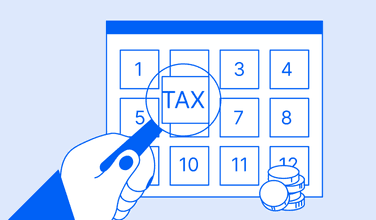All Filing Requirements & Deadlines for a Small Business in the UK
As a limited company director, you have to keep 2 government agencies informed about your business: HMRC and Companies House. There are various forms and payments to take care of, and different filing timelines do not make it any easier. Let us glue all the pieces into a single picture, shall we?

As a limited company director, you have to keep 2 government agencies informed about your business: HMRC and Companies House. There are various forms and payments to take care of, and different filing timelines do not make it any easier. Let us glue all the pieces into a single picture, shall we?
Before you start actual filing with the government, you need to make sure your books are in order. Ask our experienced bookkeepers and they will make sure they are.
To do that, first, there are 3 main terms you have to make sense of:
Accounting Reference Date — given by Companies House, the last day of the month in which the first anniversary of incorporation falls, it’s a deadline to which a company's financial accounts are prepared.
Accounting Period for Corporation Tax — given by HMRC, begins when you start trading and usually ends on your Accounting Reference Date.
Tax year — stars on the 6th of April, ends on the 5th of April next year
Here’s all filings with timelines for both Companies House and HMRC.
Filing information for Companies House
As soon as your company is incorporated, Companies House gives you an Accounting Reference Date. The first Accounting Reference Date is the last day of the month in which the first anniversary of incorporation falls. This means that the Accounting Reference Date for the first set of Company Accounts you file will often have a period longer than 12 months. For example, if your company incorporated on 14 November 2019, your Accounting Reference Date would usually be 30 November 2020.
Statutory Accounts (also known as Year-end Accounts)
Every year you must submit at least Statement of Financial Position (also known as Balance sheet) and other information in accounting notes to make information about your company finances public in accordance with the Companies Act 2006. SME can opt to submit only the Balance sheet of the company.
When to file: The accounts must be submitted to Companies House within nine months after the accounting period end. However, if you are not sure when your company's account is due to be submitted, contact the Companies House and find out the due date. To obtain the information you’ll need your company name or number.
Filing information for HMRC
For your Company Tax Return and payment of Corporation Tax, you’re given an accounting period by HMRC which begins when you start trading and usually ends on your Accounting Reference Date.
Form CT600
UK-based limited companies are required to submit an online form called a CT600 to HMRC annually. Form CT600 contains details about your company’s income, minus any tax allowances and business expenses. The remaining amount – your taxable profit – will then be used to calculate how much Corporation Tax your company must pay.
When to file: your first Corporation Tax return is due 12 months after your first year end. Important detail — in the case of first-year accounts, the two sets of tax return need to be submitted, please consult with your accountant for more details. In the subsequent year, generally, tax return is submitted within 12 months after the end of the accounting period.
By the way, this article is enough for you to speak the same language with your accounting services provider but it surely cannot substitute professional help.
Corporation Tax Payment
You will need to pay Corporation Tax to HMRC if your company made a profit in the accounting period. In order to pay your Corporation Tax, you’ll need to log into your HMRC online account and choose a payment method: online or telephone payment, direct debit, payment via your bank or by a company credit card.
When to pay: any Corporation Tax you owe must be paid by nine months and one day after your company’s accounting period ends. You have the option to pay at any time during this period, but it is highly recommended to pay as soon as possible to avoid fines.
Employment Related Securities return (ERS)
If your company provides or transfers shares to its employees or directors, you’ll most likely need to submit information about these changes on an Employee Related Shares (ERS) return to HMRC. Why ‘most likely’? ERS schemes and returns can either be tax-advantaged or non-tax advantaged. Tax-advantaged are the following ERS schemes:
- Share Incentive Plans (SIP)
- Save as You Earn (SAYE)
- Company Share Option Plans (CSOP)
When you don’t need to file an ERS return:
- The transfer of shares takes place before the company starts trading
- Share transfer is to shareholders who are not employees or directors, for example share transfer in the normal course of domestic, family, or personal relationships (such as between spouses) is non-tax advantaged and does not need an ERS return.
Note that once your ERS scheme is registered, you’ll need to submit an ERS return (or nil return) each year even if: there have been no transactions, you’ve appealed a late filing penalty, the scheme has been registered in error or there’s a duplicate scheme, you did not get a reminder from HMRC.
ERS schemes and returns are complex area and it’s always worth checking with an accountant.
When to file: each year you must submit your ERS return to HMRC by 6th July following the end of the tax year, or you may have to pay a penalty.
P11D
Form P11D summarises the value of any benefits and expenses provided to directors and employees in a tax year, which aren’t included in their salary or wages. They’re also sometimes called ‘perks’ or ‘fringe benefits’. Details are required for all directors and employees, so even if your company only has one director (i.e. you), you still have to file a Form P11D with HMRC and keep a personal copy for your own records. If no benefits are provided to any director or employee, you either have to file a nil P11D or tell HMRC one isn’t needed to file this form.
When to file: directors and employees must receive a copy of their P11D before 6th July following the end of the relevant tax year.
PAYE
When you’re the director of a limited company, you’ll probably want to pay yourself a salary via a PAYE scheme since you’re also an employee of the company.
When to file: PAYE information is usually submitted to HMRC either monthly or weekly.
VAT Return
Legally, you must register for VAT if your annual turnover is in excess of £90,000 per annum (on a rolling 12-months basis) for the 2019/20 tax year, so if you think you are getting close to this turnover you should think about registering early so you don’t face a fine. The standard rate is of VAT is 20%.
When to file: at the end of every quarter, or in some cases annually, a VAT registered limited company must add up all the VAT they’ve added to sales, and then deduct the VAT they’ve paid on business expenses. You may need to submit using Making Tax Digital (MTD) compatible software and then keep your VAT records digitally.
Now let us move on to directors' personal tax obligations.
Self Assessment
The director of a limited company must submit an annual Self Assessment tax return of their personal income and allowances to HMRC. The Self Assessment (also known as a personal tax return) must include details about all of your income from employment, dividends paid to you by your company and other sources such as rental income or sole trader income. You can claim allowances for items such as personal pension contributions.
When to file: the return is due by 31st January each year. However, it is strongly recommended to file as soon as you have your P60 from the relevant tax year, as HMRC become virtually unreachable closer to the submission date.
Payment on Account
If more than 80% of your income gets taxed through PAYE, then this won’t apply to you. Otherwise, if your Self Assessment bill is more than £1,000, you’ll need to make a payment on account. If you owe any personal tax, HMRC requires you to make 2 payments on account each year:
- First payment on account 31st January
- Second payment on account 31st July.
If you completed a Self Assessment for the previous tax year, and the amount of tax outstanding was more than £1,000, you pay that amount and a contribution towards the new tax year based on an HMRC estimate. A second payment for the new tax year is then due on 31st July, again based on an HMRC estimate. Find out more about a Payment on Account and why it catches people out. (Please speak to your accountant for bespoke advice).
When to pay: by January 31 and by July 31.
Great news! You can start your UK company online and our experts will help you make this process as convenient as it can be.







